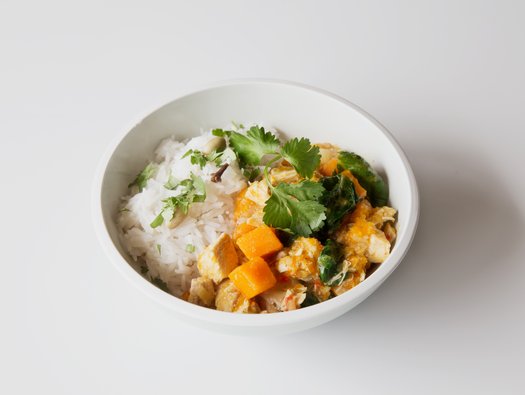Turkey curry

A filling, mildly spicy dish with lots of flavour that is high in protein, low in potassium, phosphate and salt. A perfect dish if you are receiving dialysis.

A filling, mildly spicy dish with lots of flavour that is high in protein, low in potassium, phosphate and salt. A perfect dish if you are receiving dialysis.
1 tablespoon olive oil
25g unsalted butter
1 large onion
4 garlic cloves
2.5cm fresh ginger
1 red chilli
2 teaspoons curry powder
1 butternut squash (approx. 300g)
570ml low salt chicken or turkey stock
185ml coconut milk
Handful of spinach (approx. 50g)
1 tablespoon lemon juice
400g cooked turkey
1 tablespoon fresh coriander leaves (optional)
240g basmati rice
1 cinnamon stick
1 teaspoon of whole cloves
1 teaspoon cardamom pods
Put the rice into a bowl, fill with cold water and rinse well, tipping out the cloudy water. Repeat 3-4 times. Cover with water and leave to soak for up to 30 minutes then sieve and tip into a saucepan. Add 600ml fresh cold water, and the spices. Bring to the boil and cover immediately with a tight-fitting lid. Turn the heat to low and simmer for 10 minutes – resist the temptation to lift off the lid. After 10 minutes, turn off the heat, keep the lid on and leave to stand for 5 minutes. Run a fork through the rice to separate the grains, remove the spices.
Meanwhile, prepare the vegetables by peeling, deseeding and cubing the squash. Finely chop the garlic, onion and chilli (removing seeds). Heat the oil and butter in a large saucepan. Add the onions and cook for 2-3 minutes. Then, add the garlic, chilli, curry powder and grate in the ginger. Cook over a medium heat until the onion is soft, being careful not to burn the curry powder.
Add the squash and cook until it begins to stick to the bottom of the pan slightly. Add the stock and bring to the boil. Reduce the heat and simmer for 10 - 15 minutes, until the butternut squash is tender.
Stir in the coconut milk and lemon juice. Add the cooked turkey, fold in and simmer to heat through and then add the spinach and heat until wilted. Serve with the cooked rice and sprinkle over roughly chopped coriander leaves.
The rice is the main source of carbohydrate in this main meal and the carbohydrate value has been provided for those who have been trained in insulin adjustment.
Although this dish contains some high potassium ingredients, such as the butternut squash, coconut milk and spinach, the amounts used in the recipe have been kept minimal to ensure when used in these quantities that the meal overall is low in potassium.
This dish is also low in phosphate, however, still contains phosphate due to the turkey. If you have been prescribed a phosphate binder, ensure you take them with this dish.
This dish is high in protein which makes it perfect for those receiving dialysis. If you have been advised to follow a low protein diet, then you could reduce the amount of turkey used.
Use a gluten-free stock cube.
Use low-salt vegetable stock and replace the turkey with meat substitute pieces or a 400g drained tin of chickpeas.
For a healthier option, you could use a reduced fat coconut milk.
For a cheaper option, use chilli flakes to replace the fresh chilli and frozen coriander in place of fresh.
Once cooked, allow to cool and store, in the fridge, in an airtight container for up to 3 days. Do not store or re-heat the rice.
You could also use left over chicken from a roast dinner or buy precooked chicken or turkey to make this recipe.
To release the cardamom flavour from the pods, lightly crush them with the back of a spoon.
Kidney Kitchen South Asian Recipes magazine is an exciting collection of great tasting and colourful South Asian traditional recipes, developed with kidney dietitians. Look through the magazine for a selection of tasty breakfasts, snacks and dinners the whole family will enjoy – and safe for people living with kidney disease to eat.
You can enjoy a wide variety of delicious and healthy food when you are living with kidney disease. All Kidney Kitchen recipes are analysed and approved by kidney dietitians. Search through our kidney-friendly recipes or filter them by category below.
This dish is a traditional family recipe from the Bengal Coast. A wonderful use of spices makes this dish a flavourful meal that’s low in salt, potassium and phosphate.
By giving us your email address, you're giving us permission to send you the latest news from Kidney Care UK. Further information about how we protect and use your personal data is available in our Privacy policy. If you would like to change the way we communicate with you at any time please email [email protected]. You can unsubscribe at any time by using the link at the bottom of every email we send.